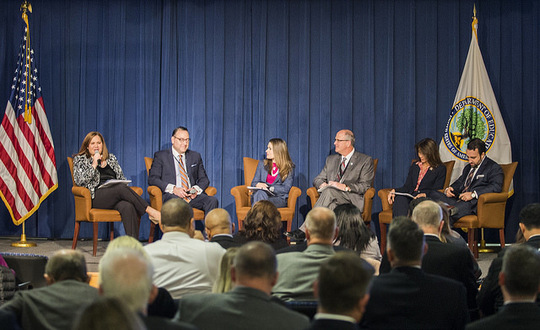
The Center for Faith and Opportunity Initiatives hosted the U.S. Department of Education’s first Faith Leader Summit on November 9, 2018. The Summit afforded leaders of faith-based organizations to hear from Senior Leadership about the Administration’s goals and objectives for the Department, multiple education options to help promote the success of every student, and how faith leaders can be actively involved at a local level. Panels and breakout sessions covered updates regarding School Safety, K-12 Policy, ESSA Implementation, Career, Technical, Adult Education and Apprenticeship Opportunities, and Higher Education.
Tuition-Free Summer Programs for K-12 Educators and Higher Education Faculty
The National Endowment for the Humanities (NEH) funds tuition-free summer programs for K-12 educators and higher education faculty. Programs are held throughout the country, and participants receive stipends to help cover travel and living expenses. These one- to four-week study opportunities focus on important topics, texts, and questions in the humanities; enhance the intellectual vitality and professional development of participants; build a community of inquiry and strong models of scholarship and teaching; and promote connections between teaching and research in the humanities. The deadline for applications is March 1, 2019.
California Wildfires
Faith leaders are essential partners to helping communities stay informed about resources that may benefit their communities. The Federal Emergency Management Agency (FEMA) announced that federal disaster assistance has been made available to California to supplement state, local, and tribal recovery efforts in the areas affected by wildfires beginning on November 8, 2018, and continuing. The President’s emergency declaration makes federal funding available to affected individuals in Butte, Los Angeles, and Ventura counties (fact sheet).
Due to evacuations or hazardous air quality, hundreds of educational institutions statewide have been impacted by the wildfires, with schools closed in 22 counties. The Department’s primary role in natural disasters is to assist local school districts and institutions of higher education in recovery efforts. Beyond its many federal partners, the Department has reached out to the California Department of Education and institutions of higher education in the impacted areas and is coordinating recovery activities through these entities.
The full extent of the wildfires’ impact will not be known for some time, but the agency will stay in close contact with its state and local partners.
Rural Resource Guide
Faith-based leaders can share the Rural Resource Guide that the Rural Opioid Federal Interagency Working Group has released to help build resilient communities and tackle opioid misuse in rural areas. The Department of Education is one of more than a dozen federal agencies represented on this working group, which is co-chaired by the Department of Agriculture and the Office of National Drug Control Policy.
OCR Manual
Faith-based leaders may be interested in knowing that as part of its ongoing work to protect students’ civil rights and effectively, efficiently, and fairly investigate civil rights complaints, the Department announced additional improvements to its Office for Civil Rights’ (OCR) Case Processing Manual (CPM). The CPM provides guidelines for field investigators working to investigate and resolve complaints and to ensure that schools comply with the laws and regulations enforced by OCR.
myStudentAid Mobile Application
On November 13, Secretary DeVos traveled to Tennessee, joining U.S. Senator Lamar Alexander at Sevier County High School to show students and guidance counselors how to use the recently launched myStudentAid mobile application. To date, more than 209,000 individuals have downloaded the app, and over 2.9 million have completed the 2019-20 Free Application for Federal Student Aid (FAFSA®). Approximately 10% of FAFSA submissions have come through the app. Faith leaders serving students who are planning to go to college can share information about myStudentAid.